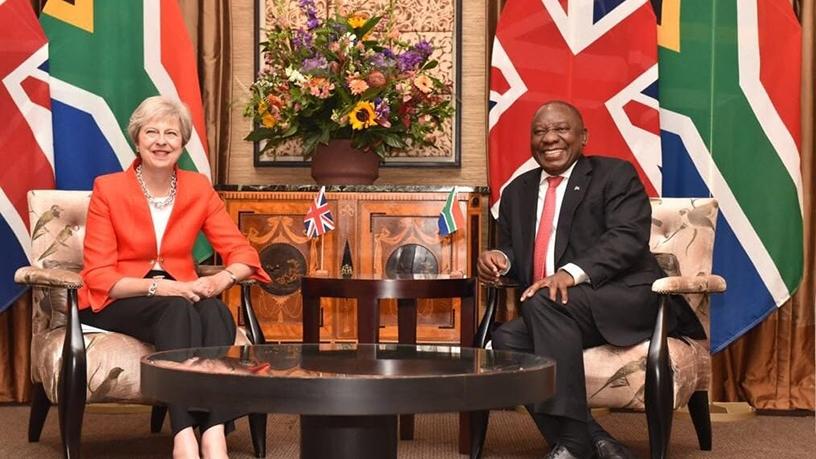
The UK government has unveiled innovative partnerships with African countries to boost innovations in technology across the continent.
Theresa May is leading an ambitious trip to Africa this week on her first visit to the continent as prime minister.
This visit comes at a time of enormous change across Africa, with a unique opportunity, as the UK moves towards Brexit. As such, the UK has indicated it seeks to invest in and work alongside African nations, with mutual benefit.
According to May's office, her central message will be focused on a renewed partnership between the UK and Africa, which will seek to maximise shared opportunities and tackle common challenges on a continent that is growing at a rapid pace.
Bilateral relations between SA and the UK are strong, covering a range of areas of cooperation linked to both governments' priorities.
The UK was SA's sixth largest global trading partner in 2017, with a total trade at R79.5 billion.
New jobs
The UK government says a series of ambitious new innovation partnerships between the UK and Africa are expected to stimulate significant economic growth and support the creation of thousands of new jobs.
The partnerships, announced by May as the UK strengthens ties with the region, will be established in African countries with growing technology sectors where there are young, expanding populations with ideas and innovations developing at a rapid pace, it notes.
Building on the UK's already-strong investment in science and research in Africa, the partnerships will enable UK and African entrepreneurs to share skills and ideas, and encourage future trade.
The increased engagement comes after the UK's Department for International Trade announced the appointment of a dedicated Her Majesty's trade commissioner to Africa. Emma Wade-Smith will now lead a team which will provide expert in-country investment and export advice for UK and African companies.
The UK government says the tech sector is one of the fastest growing sectors in Africa. The continent's start-ups raised 50% more venture capital in 2017 than in 2016, and the majority of this is being invested in SA (£130 million), Kenya (£114 million) and Nigeria (£89 million), it adds.
Nigeria and Kenya's technology sectors are also growing rapidly and generate more than 10% and 11% of their respective economic output.
"Technology can help transform societies by increasing economic participation and creating sustainable jobs and growth. It also increases the potential for countries to 'leapfrog' to the latest developments," says the UK government.
Dedicated teams
It points out that dedicated UK science, technology and innovation teams will build on the strong existing science relationships with SA and Kenya, including through the shared investments in the Newton Fund and high-end research programmes like the Square Kilometre Array.
The aim is to leverage all of the UK's investments in science and research, and broaden this into the regions across Africa to achieve real impact and support mutual interests.
New regional tech experts in Kenya and Nigeria will build links between the UK and Africa's cutting-edge digital sectors; support a wide range of start-ups to grow and create jobs; and help those in need of digital skills get access to training.
A significant new DFID programme will accelerate the growth of promising technologies and support start-ups to grow sustainably, including through early-stage investment, connecting them with private financing, and building connections with UK peers.
The UK adds it will accelerate the rollout of digital skills and entrepreneurship programmes, including TeXchange, Global EdTech Awards, Go Global, and Founders and Coders programmes in Nigeria, Kenya and SA.
"These new innovation partnerships will not only help countries turbocharge their development, but they will also promote the UK as the place to start and grow a digital business," says Jeremy Wright, UK's digital secretary.
"Nigeria, South Africa and Kenya's technology sectors are growing rapidly and generating a significant part of their economic output. This means huge opportunities for UK businesses and for future partnerships.
"New ideas, game-changing research and cutting-edge science are good news for our African partners and good news for the UK's world-leading scientists, technologists and researchers who are representing the country on a global stage," he notes.
Entrepreneurial spirit
"I'm delighted to see these ambitious partnerships being driven forward in one of Africa's most rapidly-growing sectors," says Wade-Smith.
"We're already seeing fantastic work being done to transform the UK and Africa's shared entrepreneurial spirit into jobs and growth. In my role, I see first-hand the huge potential Africa holds for British businesses looking to create modern trading partnerships."
Julian David, CEO of techUK, notes that Africa's economy is projected to grow by 3.2% in 2018 and to a further 3.5% in 2019, according to the latest 2018 World Bank report.
"Kenya, Nigeria and South Africa represent a significant part of that growth, with technology increasingly underpinning these numbers. The decision to set up innovation partnerships and extend the tech hub network to these African nations shows the [UK] government clearly recognises this opportunity.
"The decision will allow the UK tech community to engage with high-growth markets internationally, and in turn provide an important corridor for international communities to engage with our burgeoning UK tech sector."
* Article first published on itweb.africa
Share